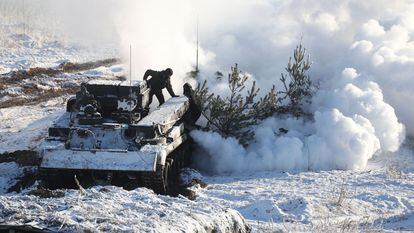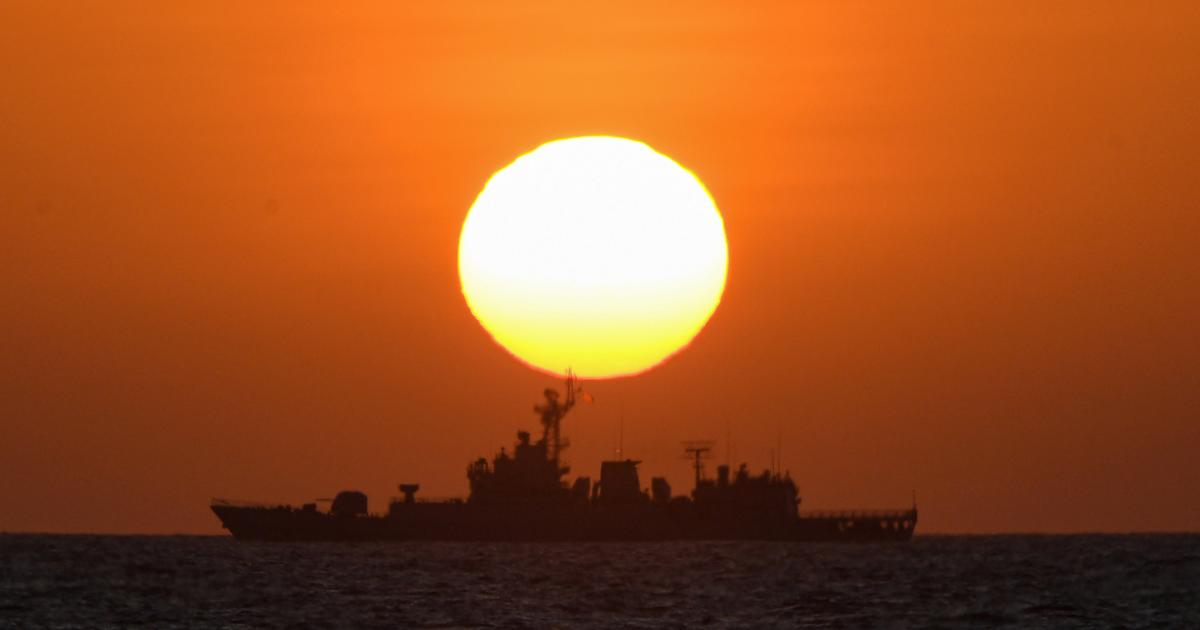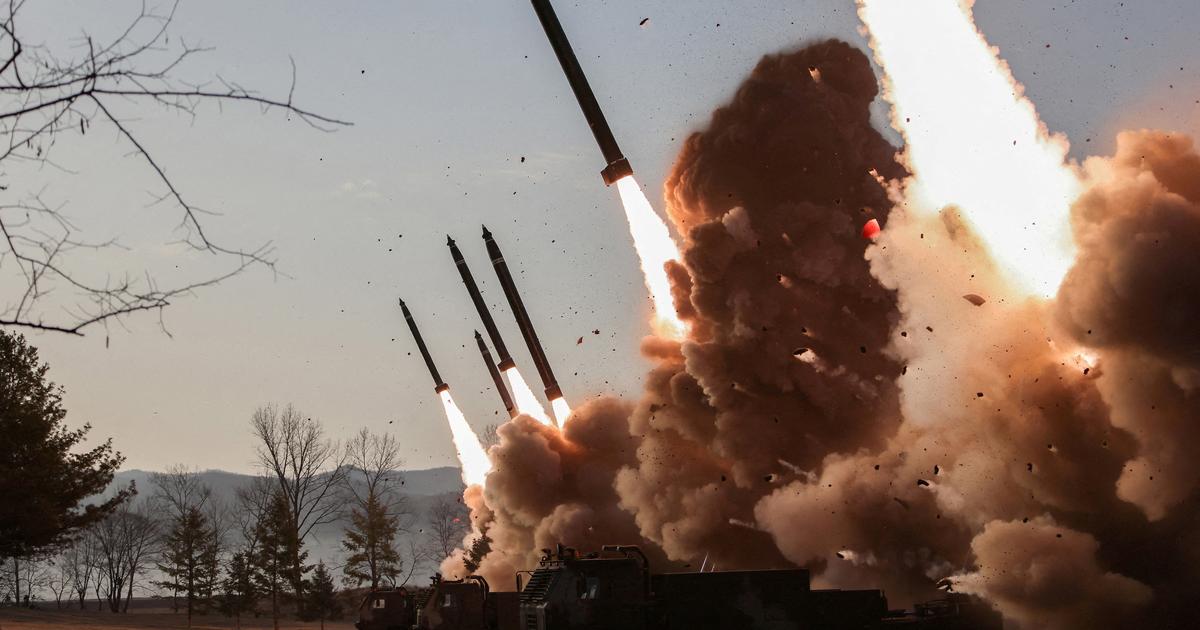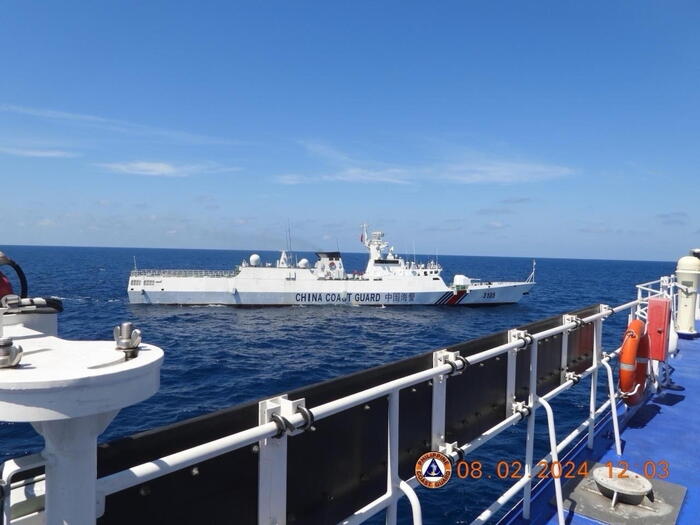Chinese soldiers participated in a sporting event organized by Russia, last Tuesday in Alabino, on the outskirts of Moscow. MAXIM SHEMETOV (REUTERS)
Chinese troops will train side by side with Russian troops in one of the most important military exercises for Moscow.
The Asian giant's Ministry of Defense has announced that the People's Liberation Army (its Armed Forces) will take part in the Vostok 2022 strategic exercises, maneuvers announced a year ago to great fanfare and that will also include soldiers from India, Belarus , Tajikistan and Mongolia.
However, the stagnation of the war in Ukraine hovers over military exercises that have recently been a display of muscle by the Russian Armed Forces.
The exercises will take place from August 30 to September 5 in Russia, at 13 locations in the Far Eastern Military District.
In its note, the Chinese military portfolio ensures that these joint tests are part of the bilateral cooperation agreement between the two powers and emphasizes that "they are not related to the current international and regional situation."
According to the text, the objective is to "deepen the practical and friendly cooperation of the participating armies, improve the level of strategic coordination and strengthen the ability to respond to various security threats."
The first time China participated in the Vostok (East, in Russian) exercises was in 2018, the year in which it sent 3,200 soldiers, 1,000 weapons, 30 planes and helicopters.
More information
Follow here the last hour of the Russian invasion in Ukraine
These are the first large-scale military exercises since the training with which Russia masked its massive deployment around Ukraine before launching its offensive on February 24.
The units of the Far Eastern Military District that have not been sent to the front will participate in them, as well as the airborne forces, one of the most punished at the beginning of the conflict, and long-range aviation.
“Pay attention that only a part of the Armed Forces of the Russian Federation participates in the special military operation (the offensive on Ukraine), and their number is sufficient to fulfill all the tasks set by the Supreme Commander-in-Chief (Vladimir Putin)”, the Ministry of Defense assured in a statement to justify these exercises, announced a year ago, while his military campaign continues without a clear horizon.
The maneuvers will be directed by the second in command, the chief of the General Staff of the Russian Armed Forces, Valeri Gerasimov, who has been relegated to a discreet background by not appearing in the press since the first setbacks suffered at the beginning of the war almost half a year ago.
Russian soldiers participated in maneuvers on February 12 in the Belarusian region of Grodno. LEONID SHCHEGLOV (AFP)
Friends, though at a price
The announcement comes after two weeks in which China has been conducting unprecedented military exercises around Taiwan, in response to the controversial visit to the island by the Speaker of the United States House of Representatives, Nancy Pelosi, and, more recently, , to that of a delegation of five US congressmen.
The Asian giant, which considers Taiwan an inalienable part of its territory and whose reunification is "a historic mission", perceives the trips of high-ranking foreign officials to the island as a message of support for independence.
Putin this week called Pelosi's 19-hour stop in Taipei a "carefully planned provocation" by the United States with the sole aim of sowing chaos in the region.
"The United States has added fuel to the fire once again to stir up the situation in the Asia-Pacific region," said the president at a congress on international stability where he criticized the West for forming its own blocs, such as the Aukus (Australia, United Kingdom, USA), “in an analogy of NATO in Europe”.
China's Foreign Ministry welcomed the remarks on Wednesday, saying they demonstrate "high-level strategic coordination" and "the strong support the two countries have given each other on issues related to their core interests."
Beijing and Moscow closed ranks against the common enemy, the United States, on February 4 in the Chinese capital, when Xi Jinping received his Russian counterpart before the opening of the Winter Olympics.
That long-awaited meeting, the first of the Chinese leader face to face with another president since the start of the pandemic, was an "unprecedented" and "unwavering" display of unity, in the words of both leaders.
The two countries have strengthened their relationship in the last eight years, after Russia annexed the Ukrainian peninsula of Crimea and Beijing economically and diplomatically helped Moscow with a gas purchase agreement.
But the joint statement in February took a giant step forward in this rapprochement, since it represented an explicit rejection of the global order led by the United States.
China for the first time declared its explicit opposition to NATO expansion;
and Russia, to Aukus.
In addition, Moscow declared that Taiwan is part of Chinese territory, one of the great political priorities of the Xi government.
The two presidents made it clear that the ties between their governments "have no limits."
So much so that China has refused to publicly criticize or endorse the Russian invasion of Ukraine, which began 20 days after that meeting.
Although Beijing has criticized Western governments for cutting trade relations with Russia, the Asian superpower is taking advantage of this situation.
"Chinese companies are actively buying raw materials because, due to sanctions, Russia is forced to sell at deep discounts what it used to sell to the European Union," admits the Russian bank Tinkoff in a market analysis.
For their part, metallurgical companies "sometimes have to sell products to China below cost."
Discounts on hydrocarbons reach up to 50% compared to the market, depending on the sector.
The Vostok exercises will be the second joint exercises that Russia and China have carried out this year.
In May, bombers from both nations flew near Japan and South Korea, forcing these two Asian countries to deploy their own fighters in response.
Those 13 hours of maneuvers coincided with the visit to Tokyo of the US president, Joe Biden, on the occasion of a meeting of leaders of the Quad (Australia, India, Japan and the US).
A year ago, China and Russia held joint training in north China involving more than 10,000 soldiers.
The United States has also recently held similar military exercises in various parts of Asia.
US Army troops have practiced in Indonesia with allied forces, including Australia and Japan, and in South Korea, where hundreds of activists took to the streets of Seoul in protest.
nuclear threat
The Belarusian regime will send a testimonial detachment to Vostok 2022 to reinforce the message that Russia has its support.
Some 250 soldiers from a Belarusian mechanized brigade will participate in the exercises, the first major ones since the February maneuvers, which served as a platform to launch their offensive towards kyiv on the shortest front, the one that crosses the Chernobyl region.
Precisely nuclear power plants continue to be used as a means of extortion years later.
The Russian Defense Ministry has warned that the huge plant in Zaporizhia could be bombed this Friday, coinciding with the visit to Ukraine of the UN Secretary General, António Guterres.
Once again, Moscow accuses kyiv of preparing alleged "provocations" to blame Russia, although the Ukrainian president, Volodymyr Zelensky, has denounced that the latest attacks launched against a radioactive material storage area came from Russian forces as a way of "blackmail" against his country.
The head of the International Atomic Energy Agency, Rafael Grossi, has denounced for his part that the risk around that plant, where there are six reactors, "is serious."
Follow all the international information on
and
, or in
our weekly newsletter
.










/cloudfront-eu-central-1.images.arcpublishing.com/prisa/2C5HI6YHNFHDLJSBNWHOIAS2AE.jpeg)




